With Camille Cosby, She Documented Black Elders
From Friday: The Racial Subtext on Ukraine
Treatment of Africans, Reporters’ Words at Issue
Homepage photo: Renee Poussaint at the University of Maryland, where she had been an adjunct lecturer. (Credit: Flickr)
[btnsx id=”5768″]
In 1990, Susan King, who went on to become journalism dean at the University of North Carolina – Chapel Hill, co-anchored with Renee Poussaint on Washington’s WJLA-TV. The station produced several joint promos with “ABC World News” and its anchor Peter Jennings. (Credit: YouTube)
With Camille Cosby, She Documented Black Elders
Renee Poussaint, a former network correspondent for CBS and ABC and a co-anchor of the 6 and 11 p.m. news on Washington’s ABC affiliate for more than a decade, died Saturday at 77, the station, WJLA-TV, told staff members on Tuesday. No cause of death was reported, but Poussaint’s friend Paul Berry, a former anchor at WJLA, said she had been battling lung cancer.
As The HistoryMakers notes, “In 2001, Poussaint and Camille Cosby, educator and producer, founded the National Visionary Leadership Project. The project utilizes various educational media to record, preserve, and distribute the stories and wisdom of older generations of African Americans. The entirety of the NVLP collection is archived at the Library of Congress in Washington, D.C. as a component of the broader ‘National Visionary Leadership Project Collection.’ In 2004, Poussaint and Cosby co-authored a book titled, A Wealth of Wisdom: Legendary African American Elders Speak, which appeared on the New York Times best-seller list.
 “Poussaint (pictured) is also founder of Wisdom Works, a documentary production company. The company’s highly-acclaimed documentary, ‘Tutu and Franklin: A Journey towards Peace,’ aired nationally on PBS in 2001, and was filmed at the infamous slave port Goree, Senegal. Her work as a documentary filmmaker has also appeared on Discovery, A&E, and Lifetime. In addition, she taught journalism at the University of Maryland.”
“Poussaint (pictured) is also founder of Wisdom Works, a documentary production company. The company’s highly-acclaimed documentary, ‘Tutu and Franklin: A Journey towards Peace,’ aired nationally on PBS in 2001, and was filmed at the infamous slave port Goree, Senegal. Her work as a documentary filmmaker has also appeared on Discovery, A&E, and Lifetime. In addition, she taught journalism at the University of Maryland.”
Poussaint, who came to Washington from CBS in Chicago, was part of the early wave of Black female television anchors.
“Not long ago, the anchors on TV newscasts were all white men,” Sherri Dalphonse wrote in 2015 for Washingtonian magazine. “Then in the 1960s and ’70s, more women and people of color started delivering the nightly news. Here are a handful of local female pioneers . . . Maureen Bunyan, who in 1978 became coanchor of Channel 9’s 6 o’clock news; Renee Poussaint, coanchor of the 6 and 11 pm news on Channel 7 beginning in 1978; JC Hayward, coanchor of Channel 9’s 5:30 newscast starting in 1972; and Meryl Comer, who in 1973 became coanchor of Channel 5’s 10 o’clock news.”
Though they were on competing stations, Bunyan told Journal-isms, speaking of Poussaint, “She was a good friend to me. We spent many an hour talking about the ups and downs of our careers.”
“Her voice, and diction and everything were just perfect,” said Sam Ford, another WJLA colleague.
Berry called his friend “brilliant” and said “she understood the importance of her role — to elevate and reflect Black women in a professional way . . . whether it was dealing with someone on the street or someone in a high position.”
A graduate of Sarah Lawrence College, Poussaint went on to earn a master’s degree in African studies from UCLA, no doubt good preparation for her firm’s 2001 documentary “Tutu and Franklin: A Journey Towards Peace.” It featured discussions between Archbishop Desmond Tutu and renowned historian Dr. John Hope Franklin, appearing before a teenage audience.
Poussaint also reported from Haiti, South Africa and Uganda, faced armed overseers at a southern immigrant labor camp and hostile bikers at a bar in Ku Klux Klan territory, according to her University of Maryland bio. Poussaint won three national Emmy awards for her work on ABC’s “PrimeTime Live” for reporting, writing and interviewing, and filled in for anchor Peter Jennings on ABC’s “World News Tonight.”
” As an independent consultant and community activist, Poussaint has worked with nonprofit and community organizations to help them better define their message for a larger audience,” The HistoryMakers added.
Services are planned at McGuire Funeral Services, 7400 Georgia Ave. NW, Washington, D.C. 20012, Berry said. A spokesman for the funeral home said March 9 that the details have not yet been set.
March 11 update: The services are scheduled for Tuesday, March 22, at Plymouth Congregational United Church of Christ, 5301 N. Capitol Street, Washington, DC 20011, a spokesman for McGuire said. Visiting is scheduled from 10 a.m. to 11 a.m., with the homegoing service at 11 a.m.
- SALFA: (cause of death) Renee Poussaint dies at 77(cause of death) Renee Poussaint dies at 77 (March 9)
The Racial Subtext on Ukraine
March 4, 2022
Treatment of Africans, Reporters’ Words at Issue
Askia Muhammad Celebration to Air Saturday
Homepage photo: Zhan Beleniuk, Afro-Ukranian member of Parliament, Olympic gold medalist. (Credit: Twitter)
Journal-isms Roundtable photos by Sharon Farmer/sfphotoworks
[btnsx id=”5768″]
Jessica Orakpo and others in Ukraine from Africa and India are outraged by their treatment as they tried to leave, but Deutsche Welle talked to some who thought the racism accusations were exaggerated. Serge Nyangi, who helps Congolese students access bursaries to study in Ukraine, told the news organization Monday, “There are people trying to climb over the barriers, some are fighting with guards. If you see what is happening there, you would know it’s impossible for guards to choose who to let through.”
Treatment of Africans, Reporters’ Words at Issue
On Tuesday, the BBC interviewed Nigerian medical student Jessica Orakpo, who was trying to flee Ukraine by train for the Polish border, but was turned away. “The official literally looked me in my eye and said, “Only Ukrainians, that’s all. That if you are Black, you should walk.”
The next day, “Democracy Now!” devoted a segment to Nigerian student Alexander Somto Orah, who “says the discriminatory treatment he and other African students faced started at the train station in Kyiv and continued at the border with Poland.
” ‘We started protesting and telling them they have to let us go, that this is rubbish. They take in like a hundred Ukrainians and then take in like two Africans. It doesn’t make sense, because there are more Africans there than Ukrainians at the border,’ Orah recalls. ‘So we started pushing, and the police cocked their guns and pointed at us . . . and told us that they’re going to shoot us.’ Orah eventually made his way to Warsaw and is now helping other students to cross.”
In South Asia, meanwhile, readers of Outlook India saw a story headlined: “Racism Amid War: Asian And African Students Face Discrimination While Fleeing Ukraine.”
The Journal-isms Roundtable held a special Zoom session on Ukraine Tuesday with MSNBC terrorism expert Malcolm Nance, Remi Adekoya, a U.K.-based, Polish-Nigerian journalist and lecturer of politics who spent 19 years in Poland, and others. Fifty-three people were on the Zoom; another 58 watched via Facebook; more than 140 had watched the video on YouTube as of Friday morning. You can see the video here or click on the embedded version above.
News stories had already appeared reporting on the refusal of some gatekeepers to allow Africans and Indians to leave Ukraine, and about the language used by some Western correspondents. The Arab and Middle Eastern Journalists Association characterized their reports as “examples of racist news coverage that ascribes more importance to some victims of war over others.” [PDF]
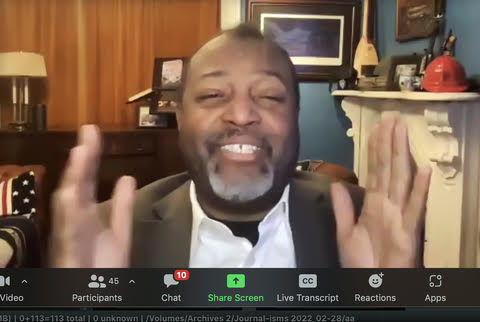 Nance (pictured), a former counterintelligence agent, had just returned from a month in Ukraine. He said the news media and some analysts had underestimated the resilience of the Ukrainians. “For some strange reason, the news media seemed to forget that Ukraine had an army,” Nance said. “They only showed . . . the Russian propaganda videos of Russian forces on battle exercises.
Nance (pictured), a former counterintelligence agent, had just returned from a month in Ukraine. He said the news media and some analysts had underestimated the resilience of the Ukrainians. “For some strange reason, the news media seemed to forget that Ukraine had an army,” Nance said. “They only showed . . . the Russian propaganda videos of Russian forces on battle exercises.
“They only spoke about the Russian army. They only spoke about how fast the Russians would take Ukraine. . . .”
Nance was in the country as part of an “asymmetric warfare analysis group” that spoke with the Ukrainian soldiers. He was not representing a news organization.
Nance alerted us to the existence of Afro-Ukrainians, who are rarely mentioned in the U.S. mainstream media.
Adekoya (pictured, below) acknowledged that racial concerns were not top of mind either in Europe or in the Americas as the world reacted to the invasion the Russians began on Feb. 24. “I’m sort of. . . talking about this because we are in a sort of a collection of mostly Black or people of color and journalists here,” he said. “I have no doubt — I lived there for 19 years. I know eastern Europeans don’t really care what Black people think about them, you know, so I have no illusions about that.”
Given that audience, ears perked when Nance mentioned his friend and colleague Terrell Jermaine Starr, a Black U.S. journalist who has studied Eastern Europe and is now reporting from there for Rolling Stone and other outlets. Among the few other Black journalists, Karl Bostic was reporting for PBS and Clive Myrie for the BBC. Ann Simmons, Moscow bureau chief for The Wall Street Journal, appeared from Russia Friday on PBS’ “Washington Week.”
Starr is “awesome,” Nance said. “I mean he gets tens of thousands of comments now [on social media], because he is the African American perspective on what’s going on there.
“More important, he educated us all on something we didn’t know: There is an Afro-Ukrainian society.
“There are people who are children of mixed-race marriages in Ukraine, and, in fact, one of the top Olympic wrestlers, gold medalist Olympic wrestler was an Afro-Ukrainian who was now a member of Parliament,” Nance said in a reference to Zhan Beleniuk.
“He’s this massive, rock-looking guy, and you know his father was Nigerian, his mother’s Ukrainian. “And so there’s an entire society there which you would see, because, as he explains . . . Africans have been in Ukraine for centuries. You know, going back well into the court of Catherine.”
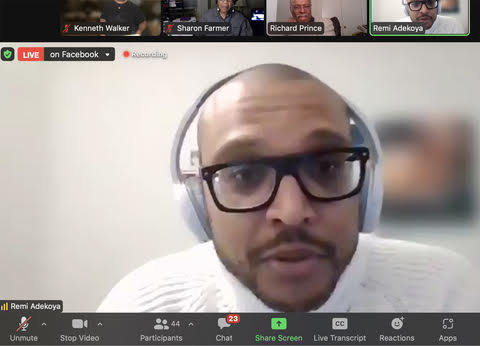 Beleniuk has acknowledged racist verbal abuse after he won at the Olympics last year, but posted a video on Facebook Wednesday asserting that “Ukraine is a tolerant state and doesn’t have any pressing racial issues,” and strongly urged African leaders to support his country in its time of need.
Beleniuk has acknowledged racist verbal abuse after he won at the Olympics last year, but posted a video on Facebook Wednesday asserting that “Ukraine is a tolerant state and doesn’t have any pressing racial issues,” and strongly urged African leaders to support his country in its time of need.
On the denied exits, Nance said the Ukrainians “have now made it a priority to get them out of the country.”
In addition to the growing number of news stories on the issue, the Nigerian government has protested, and on Wednesday in the United States, the National Bar Association announced “an urgent appeal to the Office of the High Commissioner for Human Rights for the United Nations and to the Committee on the Elimination of Racial Discrimination on behalf of African refugees facing racial discrimination . . . as they seek to flee. . . .”
With 4,000 studying in Ukraine, Nigerians made up the second biggest group of foreign students in the country. Morocco supplied the largest, with 8,000 students, while Egyptians were in third place with 3,500 students, according to Deutsche Welle.
Three days after the invasion, Al Jazeera became among the first to report dissatisfaction with Western news reports.
“On Sunday, Al Jazeera English presenter Peter Dobbie described Ukrainians fleeing the war as ‘prosperous, middle class people’ who ‘are not obviously refugees trying to get away from areas in the Middle East that are still in a big state of war; these are not people trying to get away from areas in North Africa, they look like any European family that you would live next door to.’ ”
The network apologized, saying the comments “were inappropriate, insensitive, and irresponsible”.
Charlie D’Agata of CBS News similarly apologized for his own wording.
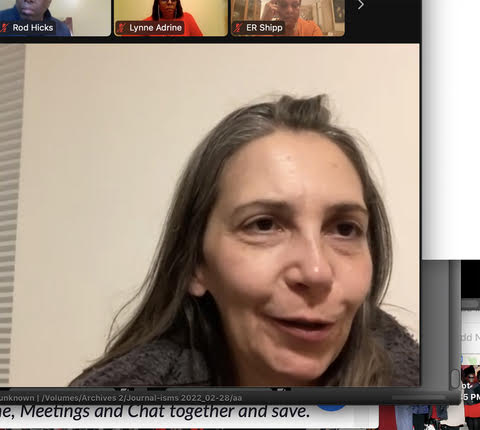 Rasha Elass (pictured), editorial director of New Lines magazine, which focuses on the “Middle East and Beyond,” was quoted in a piece by the Washington Post’s Sarah Ellison and Travis M. Andrews:
Rasha Elass (pictured), editorial director of New Lines magazine, which focuses on the “Middle East and Beyond,” was quoted in a piece by the Washington Post’s Sarah Ellison and Travis M. Andrews:
“ ‘The casual racism is shocking,’ said Elass, a D.C.-based Syrian American journalist who traveled to Syria to cover the conflict there for a variety of publications. The Russian invasion of Ukraine is jarring, because ‘this is literally the closest it has gotten in our lifetime to a world war, … and in that regard, it is very different from the U.S. invading Afghanistan or the regional war in Syria. But it is not because one area is civilized and the other is not. It is because of the geopolitics and what is at stake.’ ”
At the Journal-isms Roundtable, Elass compared the situation to that of the war in Iraq, but spoke of similarities, not differences. “There were a lot of blind spots. There wasn’t a lot of diversity in the reporters who were covering the stories. They were always just sort of no nuance.”
It wasn’t that the offending reporters weren’t correct in noting the comforting familiarities between the West and Ukraine.
“The city of Kyiv is very modern, very Western,” Nance told the group. “I’ve seen more Teslas in Kyiv that I’ve seen in Hollywood, and that’s saying something. So it’s very advanced. Sometimes I couldn’t tell whether I was In Stuttgart, or Lyon, or the suburbs of Paris, depending on where I was . . . Lviv is just like being in sections of Vienna. . . . So, so much for that theory that two countries with McDonald’s won’t go to war, right?”
Reporters for major outlets, Nance said, are staying in five-star hotels.
As for the journalists’ mindset, Kenneth Walker, NPR’s Africa bureau chief from 1999 to 2003, told the group, “I’m here to tell you, white people who are foreign correspondents for the U.S. in general tend to be some very racist people. They are supporting and advancing white supremacy. . . . They’re not there with any sensitivity to certainly people of color in places that they’re deployed. And so this is just par for the course. . . . “
Like other close observers of the news, those on the Zoom wondered where the conflict will lead. On Friday, days after the Roundtable, Ukrainian American journalist Lev Golinkin again raised the racial issue: “Ukraine’s far right is the primary benefactor on the Ukraine side of this war because they now get to attract people from all over the world, and they get to be seen as on the frontlines of fighting for white civilization,” Golinkin said.
At the Roundtable, the speculation was about Russian President Vladimir Putin. Adekoya said, “I do think he needs to be given a sort of way to somehow save face and get out of all this.”
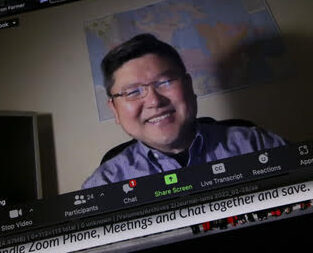 Korean-American photographer Hyungwon Kang (pictured), who keeps a close eye on East Asia, said China does not have the credibility to be a good mediator, and that the invasion is already playing a role in South Korean elections scheduled for March 9.
Korean-American photographer Hyungwon Kang (pictured), who keeps a close eye on East Asia, said China does not have the credibility to be a good mediator, and that the invasion is already playing a role in South Korean elections scheduled for March 9.
Adekoya offered a final thought:
“I read a very interesting article a couple of weeks ago, which essentially said, if you really want to understand Putin, think Dostoevsky, not Marx. So it’s not really . . . about setting up any kind of communist union, or even a Soviet Union.
“It’s an almost, you know, it’s an almost Messianic belief in this sort of Messianic role of Russia, this sort of pan-Slavic world or pan Slavic empire which he’d like to build . . . Someone from his circle was quoted [as saying] he’s recently very much into esoteric mysticism, they say, and so he’s really gone off — I don’t want to say ‘the rails’ . . . . it’s not a sort of cold calculating, you know, as we may think, and you know he’s 69 years old, so who knows?
“Maybe he thinks, you know, he’s gonna lay everything on the line . . .
“Think Dostoevsky, not Marx, and think Russia mysticism, and rather than some . . .. terribly cold, you know pragmatic calculation right here, but actually something more messianic.”
Nance replied, “You know that’s another trait that he has in common with Hitler. This is like 1939 all over again.”
- Al Jazeera: Nigeria urges respect towards Africans at Ukrainian border (Feb. 28)
- Natasha Anderson, DailyMail.com: 1619 founder Nikole Hannah-Jones blasts media for ‘insidious racism’ and claims they only care about ‘Europeans with blond hair and blue eyes’ after heavy coverage of Ukraine compared to other conflicts
- Shreya Basak, Outlook India: Racism Amid War: Asian And African Students Face Discrimination While Fleeing Ukraine
- David Bauder, Associated Press: In Wartime Battle Over Imagery, So Far It Hasn’t Been Close
- BBC: African nationals struggle to leave Ukraine (Feb. 28) (audio)
- Kevin Blackistone, Washington Post: Alex Ovechkin’s voice is powerful. His comments on Ukraine were a missed opportunity.
- Frank Buckley and Jessica Holmes, KTLA, Los Angeles: From Ukraine, journalist Terrell Jermaine Starr shares his experiences covering Russian invasion
- Carib News, New York: Jamaica government working to extract students from Ukraine (Feb. 25)
- Karen Juanita Carrillo, New York Amsterdam News: African students combat racism escaping Ukraine
- Russell Contreras, Axios: Black Ukrainian lawmaker reveals plight of overlooked population (Feb. 25)
- Deutsche Welle: Thousands of African students are stuck in Ukraine (Feb. 24)
- Sarah Ellison and Travis M. Andrews, Washington Post: ‘They seem so like us’: In depicting Ukraine’s plight, some in media use offensive comparisons
- Ashley Gold and Sara Fischer, Axios: Ukraine misinformation spreads as users share videos out of context
- Danyal Hussain, Daily Mail: BBC reporter Clive Myrie appears to shed a tear as he presents News at 10 live from Kyiv after dramatic first day of bloodshed and violence in Ukraine
- Daniel Kreps, Rolling Stone: ‘SNL’ Weekend Update Tackles ‘Tough Subject’: Russia’s Invasion of Ukraine
- Ministry of Foreign Affairs, Nigeria: Update for Nigerians in Ukraine (Twitter)
- Trevor Noah, “The Daily Show”: Ukraine War Is Exposing Racial Disparities in Refugee Treatment (video)
- Cosmos Ojukwu, Business Ukraine: Afro-Ukrainians After Euromaidan (2016)
- Outlook India: Russia Says It Is Working On Means To Provide Safe Passage To Indians Stuck In Ukraine
- Rédaction Africanews: Russia-Ukraine conflict: 256 Nigerian nationals evacuated from Ukraine
- Keith Reed, The Root: #AfricansInUkraine Reportedly Face Racism and Obstacles Trying to Flee War
- Jeevan Prakash Sharma, Outlook India: Plight Of Indian Students In War-Hit Ukraine: ‘No Help From Indian Embassy, Hostile Army’
- TMZ: NORMAL CITIZENS ARE FIGHTING BACK!!! Journo Explains from War’s Frontline (On Terrell Jermaine Starr)
- Mark Tovey, Daily Mail: African refugees fleeing Ukraine are facing ‘shockingly racist’ treatment with border guards blocking their attempts to cross the border into Poland, continent’s leaders claim
- Declan Walsh and John Eligon, New York Times: Shunned by Others, Russia Finds Friends in Africa
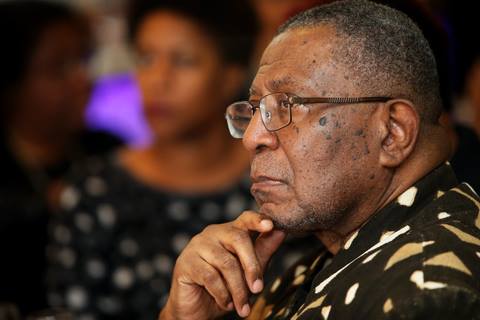
Askia Muhammad Celebration to Air Saturday
“Each Other’s Dreams: Celebrating the Life and Legacy of Askia Muhammad,” the multimedia journalist, radio host, photographer and poet who died in Washington on Feb. 17 at 76, will be streamed over the internet Saturday on the websites of Pacifica stations WPFW in D.C. and WBAI in New York.
The family and WPFW announced that the ceremony will take place in Washington March 5 from 4 p.m. to 7 p.m. Eastern at Busboys and Poets, 450 K St. NW.
“The tribute will include poetry, music, visuals, memories, and remarks in celebration of Askia’s life and legacy, as well as the reading of his poetry.
“Seating is limited; doors open at 3:30pm, and masks are required. . . .”
[btnsx id=”5768″]
To subscribe at no cost, please send an email to journal-isms+subscribe@groups.io and say who you are.
Facebook users: “Like” “Richard Prince’s Journal-isms” on Facebook.
Follow Richard Prince on Twitter @princeeditor
Richard Prince’s Journal-isms originates from Washington. It began in print before most of us knew what the internet was, and it would like to be referred to as a “column.” Any views expressed in the column are those of the person or organization quoted and not those of any other entity. Send tips, comments and concerns to Richard Prince at journal-isms+owner@
View previous columns (after Feb. 13, 2016).
View previous columns (before Feb. 13, 2016)
- Diversity’s Greatest Hits, 2018 (Jan. 4, 2019)
- Book Notes: Is Taking a Knee Really All That? (Dec. 20, 2018)
- Book Notes: Challenging ’45’ and Proudly Telling the Story (Dec. 18, 2018)
- Book Notes: Get Down With the Legends! (Dec. 11, 2018)
- Journalist Richard Prince w/Joe Madison (Sirius XM, April 18, 2018) (podcast)
- Richard Prince (journalist) (Wikipedia entry)
- February 2018 Podcast: Richard “Dick” Prince on the need for newsroom diversity (Gabriel Greschler, Student Press Law Center, Feb. 26, 2018)
- Diversity’s Greatest Hits, 2017 — Where Will They Take Us in the Year Ahead?
- Book Notes: Best Sellers, Uncovered Treasures, Overlooked History (Dec. 19, 2017)
- An advocate for diversity in the media is still pressing for representation, (Courtland Milloy, Washington Post, Nov. 28, 2017)
- Morgan Global Journalism Review: Journal-isms Journeys On (Aug. 31, 2017)
- Diversity’s Greatest Hits, 2016
- Book Notes: 16 Writers Dish About ‘Chelle,’ the First Lady
- Book Notes: From Coretta to Barack, and in Search of the Godfather
- Journal-isms’ Richard Prince Wants Your Ideas (FishbowlDC, Feb. 26, 2016)
- “JOURNAL-ISMS” IS LATEST TO BEAR BRUNT OF INDUSTRY’S ECONOMIC WOES (Feb. 19, 2016)
- Richard Prince with Charlayne Hunter-Gault, “PBS NewsHour,” “What stagnant diversity means for America’s newsrooms” (Dec. 15, 2015)
- Book Notes: Journalists Follow Their Passions
- Book Notes: Journalists Who Rocked Their World
- Book Notes: Hands Up! Read This!
- Book Notes: New Cosby Bio Looks Like a Best-Seller
- Journo-diversity advocate turns attention to Ezra Klein project (Erik Wemple, Washington Post, March 5, 2014)
When you shop @AmazonSmile, Amazon will make a donation to Journal-Isms Inc. https://t.co/OFkE3Gu0eK
— Richard Prince (@princeeditor) March 16, 2018
![]()

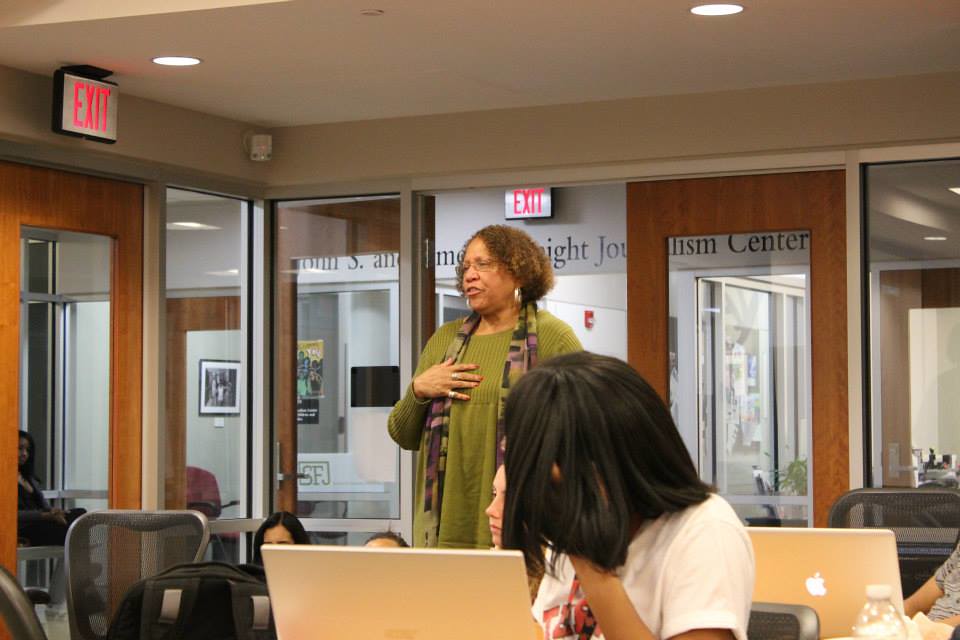
2 comments